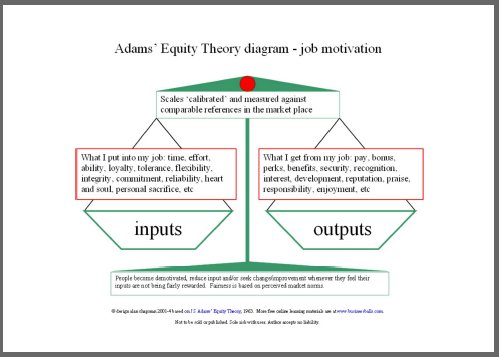The incentive theory suggests that people are motivated to do things because of external rewards. For example, you might be motivated to go to work each day for the monetary reward of being paid. Behavioral learning concepts such as association and reinforcement play an important role in this theory of motivation.
Examples of content theories include:
Hertzberg’s two factor theory
Maslow’s hierarchy of needs
Alderfer’s ERG Theory
Process Theories looks deeper into how people are motivated through goals and rewards, in other words these theories focus on people having goals and choosing how to get them by a process of calculation.
Process theories of motivation - Adam's Equity Theory At a basic level, most people generally prefer to be in relationships where give and take are about equal. So if one person is getting too little from the relationship, then clearly they are going to be unhappy with this but it is also likely that the other person will also be feeling rather guilty about this imbalance. This is reinforced by strong social norms about fairness.
Expectancy theory focuses on the connections between goal achievement and performance. It contains the idea that people work better if they believe that they will achieve results expected in their work and if the financial and persnal rewars are good enough.

Expectancy theory is comprised of three components: Expectancy, Instrumentality, and Valance.The expectancy is the belief that one's effort will result is attainment of desired performance goals. This belief, or perception, is generally based on an individual's past experience, self confidence, and the perceived difficulty of the performance standard or goal.
The instrumentality is the belief that if one does meet performance expectations, he or she will receive a greater reward. This reward may come in the form of a pay increase, promotion, recognition or sense of accomplishment.
The valance refers the value the individual personally places on the rewards. This is a function of his or her needs, goals, values and sources of motivation.
Caffe Nero was found by Gerry Ford in 1997. His aim was to bring a premium, continental-style Cafè to Great Britain. He wanted it to be authentically Italian; serving premium espresso based coffee, fresh high quality food and to become a neighbourhood gathering spot. The staff at Cafe at Nero work hard at what they do and who they work with, they aim to fulfill customers needs at high standards . They make sure they have fun at work, as well as having fun together outside of work , therefore they organise social events and parties on a regular basis.
Ways Caffe Nero motivate their employees:
- They bring a friendly, family based environment
- Salary
- Free drinks whilst working and discounts on there days off
- Annual leave/holiday pay
- Enhancement hours/bonus pay
- social events such as CN Club parties, Barista of the Year events, softball, school sports days, Italian wine and food tasting nights and many others.
www.cafenero.com
Conclusion
From my research I have found that motivating employees makes them want to work to recive rewards.
Different business and organisations motivate their employee's in different ways, for example I researched Caffe Nero and their workers and staff are more important than the products. So they use the equity motivation process by giving them a family based environment to work in, arranging social events, giving staff annual leave and enhancemant hours.
References used
Mary Simpsons (n.d.), PowerPoint Presentation
Organisational behaviour- Dr Hawa Singh (2010-2011 edition)
http://www.businessballs.com/herzberg.htm
www.cafenero.com
No comments:
Post a Comment